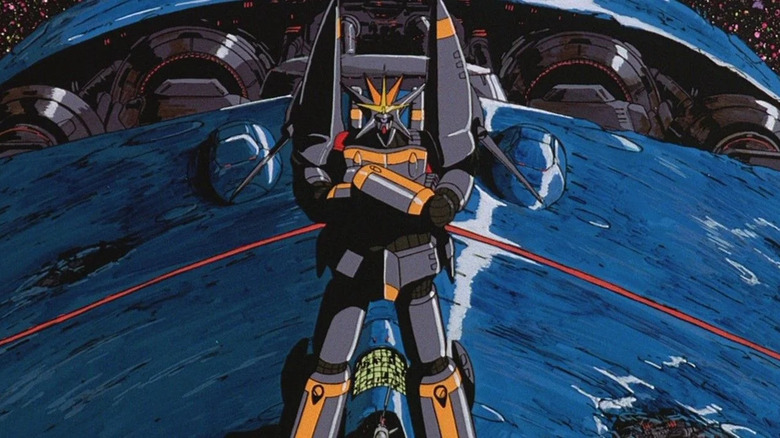What Lightyear And Interstellar Have In Common
Pixar is back in actual cinemas this year with "Lightyear," a spin-off of "Toy Story" that is not about Buzz the toy, and is definitely not about Buzz the real human astronaut, no matter what Chris Evans says. Instead, this is a movie about the in-universe sci-fi blockbuster that got turned into a cartoon, which then got turned into a line of toys.
While the first couple of trailers were vague in how much they revealed about the plot, leaning more on pretty visuals and the magic of David Bowie, the latest trailer tells us a lot more about what we can expect from the new Pixar film. Among other things, we get a closer look at the new version of the evil Zurg, but the most fascinating thing about the trailer is a surprise connection between "Lightyear" and Christopher Nolan's "Interstellar."
A man out of time
The trailer reveals that Buzz, after a mission gone wrong, finds himself on a hostile planet ... 62 years in the future. According to our own Ryan Scott, who saw the first 30 minutes of the film, this becomes the driving force of the movie, with Buzz trying to get back home.
This is what is known as time dilation, essentially a difference in how elapsed time is perceived by two observers. In movies, this concept is often portrayed as someone experiencing time at a much slower pace than others, often seeing years pass in a matter of minutes without aging.
One of the most famous examples of a recent movie that does this is Nolan's "Interstellar," which kicks off with the idea that Matthew McConaughey will be going away for years or even decades while finding a new planet for humanity to inhabit. To make matters worse, the first planet his crew lands on rotates near a black hole, making time on the surface of the planet move faster relative to Earth. By the time the crew returns to their ship after landing on the planet, 23 years have passed on Earth, even though it's only been a few hours for them.
This leads to arguably the best scene in the movie, where McConaughey sees dozens of messages his children left for him over the years, realizing that he will never be able to get those years back, that he will never be there for the birth of his grandson, or the death of his father-in-law.
Time dilation was also a key part in the landmark sci-fi film "Planet of the Apes" (the original). The twist in that movie — and if you somehow don't know what it is yet, go see the film now! — is the astronaut Taylor realizes that the planet of smart apes he's on is not some alien planet, but actually Earth thousands of years after his departure; time dilation has caused him to travel to the future despite aging less than one year.
Cue the waterworks
The time dilation trope is also popular in anime. Years before "Your Name" made him a household name, anime director Makoto Shinkai made a sci-fi romance short film about doomed lovers separated by time dilation, "Voices of a Distant Star." The film plays with the idea the value of time and the emotional gut-punch of realizing it is gone, as it follows a girl who is separated from her childhood friend and crush after being sent to space to fight a war against aliens, and the increasingly long time-lag of their correspondence.
Likewise, "Evangelion" creator Hideaki Anno's first masterpiece uses time dilation for all its emotional weight. "Gunbuster" (and to a degree, its sequel "Diebuster," too) also follows a girl engaged in an interstellar war against aliens. The miniseries has her return to Earth a few times throughout the war campaign, and each time the girl is reunited with childhood friends who are now increasingly older than her, while she's still looking like a teenager. Without spoiling much, this culminates in a finale that's equal parts a visual masterclass and an absolute tear-jerker.
Time dilation works in sci-fi because no matter the technological wonders that sci-fi writers can come up with, no matter how fantastical the scenario, as far as we know, there is no possible way to reverse its effects. While time dilation, in a way, means we can travel to the future, we cannot travel back in time, meaning stories that involve time dilation are ultimately tragedies about losing the most precious resource we have: time itself.
"Lightyear" hits theaters on June 17, 2022.


